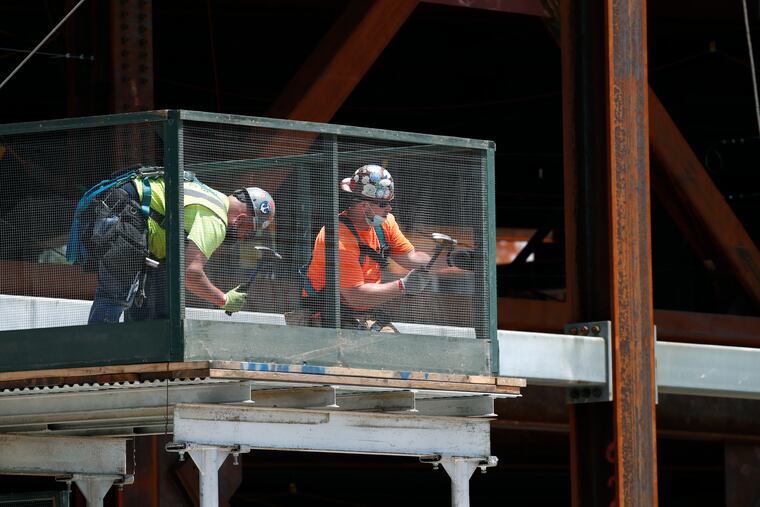The U.S. economy could see a double-dip recession if Trump administration, Congress fail to act
With no engine of growth on the other side of the business reopenings, the responsibility to ensure the economy avoids a double-dip recession later this year rests on the Trump administration and Congress.

Here’s what President Donald Trump would have us think: The worst of the COVID-19 pandemic is behind us. The economy is poised to enjoy a powerful rebound if only businesses reopen quickly. It will quickly recover the tens of millions of jobs lost during the last several months. No need for the federal government to provide more help to financially distressed households and businesses. Mission accomplished.
If only it were so.
To be sure, the economy will get a bounce as businesses reopen, and they are reopening quickly. Just more than 500 counties, accounting for about 10% of the nation’s GDP, are still locked down. But this is down from a peak of 2,600 counties — with nearly 30% of GDP — just a month ago. By mid-June, the entire country should be open for business.
However, any optimism regarding the economy as businesses reopen should be tempered by two realities.
First, immediately after the reopenings, the economy will still be a shadow of its pre-COVID-19 self. By Labor Day, real GDP will have recovered only half of what it lost during the recession. Millions of unemployed workers who are currently furloughed will be called back to their jobs, but millions will be permanently laid off, and the unemployment rate will settle close to 10%. For context, that is the peak unemployment rate during the financial crisis a decade ago.
The second reality is that the economic recovery will not take full root until there is a widely distributed, and adopted, vaccine. The economy will go sideways, and the risk that the economy will slide back into recession — a so-called double-dip recession — will be uncomfortably high. Even if there is no second wave of the virus, worry about it will cast a pall over business hiring and investment. The uncertainty may not be enough by itself to cause businesses to pull back, but it will be enough to ensure that businesses will not make major expansion decisions.
There is no global engine of growth for the coming recovery. This is a bit of a chicken-and-egg problem. The pandemic has pushed the entire world into or near recession. In past recessions, at least one major part of the global economy was able to navigate the downturn reasonably well and lead the world into recovery. China played this role during and after the financial crisis. No one will play this role in this crisis.
Expectations that U.S. consumers, as in times past, might drive the global economy out of its rut will likely be unmet. Lower- and middle-income households will struggle with the high unemployment, fewer hours, and reduced pay, while higher-income households will need to come to terms with their diminished wealth. The stock market has staged a strong comeback since hitting bottom in late March, but stock wealth remains trillions of dollars below what it was before the crisis. And, given the wild swings in stock prices during the crisis — up and down with the latest news of a treatment or vaccine — most investors are significantly discounting the recent rally.
With no engine of growth on the other side of the business reopenings, the responsibility to ensure the economy avoids a double-dip recession later this year rests on the Trump administration and Congress. They will need to come to terms soon on another fiscal rescue package, adding to the $2.4 trillion in funds already appropriated since the crisis began. Approximately one-half of those funds are already spent, and the remaining half will be spent this summer. Without more fiscal help when this money runs out, the fragile economy will likely sink under the weight of still-high unemployment.
House Democrats are on board with the need for more fiscal support and recently passed a nearly $3 trillion fiscal package. But the Trump administration and Senate Republicans are balking. They express concern over the nation’s ballooning budget deficit and mounting debt load and argue that the economic rebound will be strong enough to make these funds unnecessary. Yes, the nation’s fiscal problems are serious, but they should be tackled after the pandemic and when the economy is off and running again.
The economy may prove resilient, but it is prudent to plan that it won’t be. If it does fall back into recession, history will call this period an economic depression, and the nation’s fiscal problems will be monumentally worse.
The fast-approaching presidential election should generate the political pressure needed to convince lawmakers to see it this way and agree to another rescue package — not as large as House Democrats hope for, but large enough that with a bit of luck, and a vaccine by early next year, the recovery will remain intact. Even then, given the economic damage caused by this virus, it will take much more government support to fully recover and to legitimately proclaim: mission accomplished.